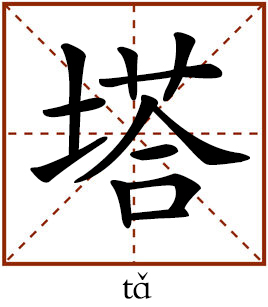Pagoda

In China, this character usually refers to a pagoda, originally used as a religious building. It also refers to a tower or tower-like building.
忽登最高塔
hū dēng zuì gāo tǎ
Hu means “suddenly” and deng “to climb up.” Zui gao means the highest and ta refers to a pagoda.
This is a line from a long poem by Su Shi (1037–1101), one of China’s greatest poets and essayists of the Song era. “Visiting Temples on the Dragon Boat Festival” is a poem about travel. Su composed it on the day of the Dragon Boat Festival in 1079 after he travelled around Huzhou (in present-day Zhejiang Province) with another poet Qin Guan. “I go sight-seeing in my sedan-chair/ And stop where there’s a scenic spot to see./ Burning incense attracts me to go where/ I may have vegetable feast and tea./ The gentle rain stops and then starts again,/ The little window looks gloomy and clean./ Shut out from sunlight by the hills, the plain/ Is overspread with grass and trees so green./ When I ascend the peak’d pagoda, all/ The boundless land extends before my eyes./ The Northern Peak overlooks the city wall;/ On the Lake Zhenze float the cloudy skies,/ A quiet place affords me keen delight;/ In space immense I feel under no yoke./ Still looking for some more secluded sight’/ I see from villages rise evening smoke./ Coming back, I write down my impression deep,/ Musing o’er it, I pass a sleepless night./ Nor do the devoted monks take their sleep,/ They sit in meditation by lamplight” (trans. Xu Yuanchong).
The first four lines indicate where Su visits with the words “incense,” “vegetable feast”—temples. The next four lines illustrate what he sees in these temples: an early summer day in the Jiangnan area, featuring rainy mists which crown the temples and the fresh clearness of the different greens. Shaded by mountains, plants grow in abundance without human interference around the temples. The poem reaches its peak when Su climbs up the Feiying Pagoda, as the view of the far horizon is breathtaking. The city wall is in the shade of the Bian Mountain while the misty, rolling waters of the Tai Lake seem to meet the sky in the distance. Su’s excitement, stirred by the magnificent view, gradually turns to calm and peace as he sees a monk sitting in meditation by an oil lamp at night, as depicted in the last four lines.
edited by REN GUANHONG

 PRINT
PRINT CLOSE
CLOSE